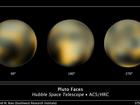A newly discovered solar system — with five small rocky planets — makes ours look like a baby.
An international team of astronomers announced Tuesday that this extrasolar system is 11.2 billion years old. With the age of the universe pegged at 13.8 billion years, this is the oldest star with close-to-Earth-size planets ever found.
 Full Story
Full Story
The U.S. government announced plans to open swathes of the western Atlantic to oil and gas drilling Tuesday, while simultaneously protecting seas off Alaska's coast.
President Barack Obama called for 9.8 million acres in the Beaufort and Chukchi Seas to be off limits, while his Interior Department announced plans to drill in the Atlantic from Virginia to Georgia.
 Full Story
Full Story
A huge haul of elephant ivory seized in Uganda probably includes tusks stolen from government strongrooms last year, wildlife officials said Tuesday.
In November, Ugandan authorities discovered that more than a tonne (2,204 pounds) of impounded ivory had vanished from state vaults.
 Full Story
Full Story
Suspicions that shooting stars come from comet dust, transformed into fiery streaks as they hit Earth's atmosphere, have been bolstered by Europe's Rosetta space mission, scientists reported Monday.
Comets and asteroids have both been eyed as possible progenitors of meteors, also known as shooting or falling stars -- and now particles spewed from comet 67P/Churyumov-Gerasimenko have provided proof of paternity.
 Full Story
Full Story
Thinking of a new career? Buying a home? Have you consulted your amygdala?
These almond-shaped clusters of neurons deep in the brain may play a vital part in long-term planning, said a study published Monday.
 Full Story
Full Story
Boeing will be the first commercial company to carry a NASA astronaut to space in July 2017 under a contract with the U.S. space agency, followed by its competitor SpaceX, officials said Monday.
NASA is funneling billions of dollars to both companies so that they can replace American access to the orbiting International Space Station after the U.S. space shuttle program was retired in 2011.
 Full Story
Full Story
NASA expects to save millions of dollars sending astronauts to the International Space Station, once its commercial crew program starts flying in a couple of years.
SpaceX and Boeing said Monday that they are on track to carry out their first manned test flights to the space station in 2017. NASA chose the two private companies last September to transport American astronauts to and from the orbiting lab.
 Full Story
Full Story
An asteroid the size of a mountain is about to shave by Earth, in a rare type of flyby that will not be seen for another decade, astronomers said Monday.
The asteroid, known as 2004 BL86, runs no risk of a colliding with Earth and will be about three times farther than the Moon when it passes.
 Full Story
Full Story
A committee of British lawmakers demanded a national moratorium on fracking due to environmental concerns on Monday, ahead of a crucial vote intended to boost the shale gas industry.
An inquiry by the cross-party Environmental Audit Committee, which examines the effect of government policy on the environment, found the extraction and burning of more fossil fuels was contrary to Britain's pledge to cut greenhouse gas emissions.
 Full Story
Full Story
Nine years after leaving Earth, the New Horizons spacecraft is at last drawing close to Pluto and on Sunday was expected to start shooting photographs of the dwarf planet.
The first mission to Pluto began in January 2006 when an Atlas V rocket blasted off from Cape Canaveral in Florida and hauled the piano-sized New Horizons craft away from Earth and on a three-billion mile journey.
 Full Story
Full Story



